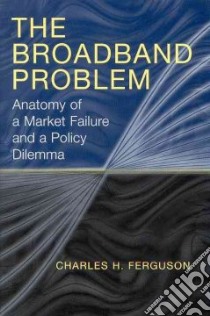The Broadband Problem - 9780815706458
Un libro in lingua di Ferguson Charles H. edito da Brookings Inst Pr, 2004
- € 18.70
- Il prezzo è variabile in funzione del cambio della valuta d’origine
While the Internet revolution has vastly improved communication among businesses and individuals, pressure has been building for faster and less expensive broadband data services. Such services could not only yield vastly improved and less expensive provision of traditional applications such as voice telephony and Web browsing, but could also enable new applications such as Internet-based television, videoconferencing, and software distribution. However, broadband services and prices have not kept pace either with demand or with progress in information technology. This new book analyzes the markets and policy issues underlying the broadband dilemma. Charles Ferguson asserts that the Telecommunications Act of 1996 and federal policy have failed to provide sufficient levels of new entry, competition, and innovation in the local telecommunications market, which remains dominated by monopoly telephone companies. New entrants and Internet-based firms such as competitive local exchange carriers (CLECs), Internet service providers (ISPs), and enhanced service providers (ESPs) remain disadvantaged relative to the monopoly incumbent local exchange carriers (ILECs). Flawed policy has also allowed ILECs to continue to engage in monopolistic practices, mergers, and anticompetitive conduct. Through a combination of inefficiency and rational monopolistic conduct, the ILECs are thus able to retard the deployment of new technology and services through delaying tactics, regulatory procedures, litigation, and political influence. Competition from the cable television (CATV) industry probably cannot fully address these problems. The CATV industry cannot compete in most business markets. In residential markets CATV's competitive potential is greater, but CATV vendors' incentives to favor their own networks, services, and proprietary content raise major concerns analogous to those raised by the ILECs. The combined result of these market and policy failures is inadequate technological progress, innovation, and productivity growth in advanced Internet services and in telecommunications services generally. This significantly retards U.S. and global economic growth, perhaps by as much as one percent per year. Ferguson believes federal policy must be adjusted to ensure the robust infrastructure necessary for advanced Internet services, electronic commerce, open-systems HDTV, videoconferencing, and improved voice telephony. Ferguson recommends several policy changes, including increased regulatory surveillance of ILEC conduct, antitrust actions against ILECs, limits on conflicts of interest in government and academia, limits on CATV control of proprietary content, and possibly tax measures to stimulate construction of competitive
Informazioni bibliografiche
- Titolo del Libro in lingua: The Broadband Problem
- Sottotitolo: Anatomy of a Market Failure and a Policy Dilemma
- Lingua: English
- Autore: Ferguson Charles H.
- Editore: Brookings Inst Pr
- Collana: Brookings Inst Pr (Paperback)
- Data di Pubblicazione: 01 Gennaio '04
- Genere: BUSINESS and ECONOMICS
- Argomenti : Telecommunication policy United States Broadband communication systems United States
- Dimensioni mm: 234 x 133 x 12
- ISBN-10: 0815706456
- EAN-13: 9780815706458


